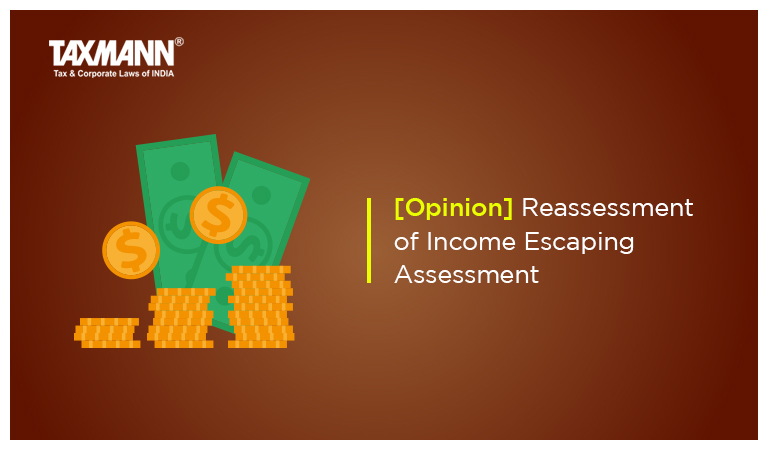[Opinion] Reassessment of Income Escaping Assessment
- Blog|News|Income Tax|
- 3 Min Read
- By Taxmann
- |
- Last Updated on 22 September, 2022

Sanjeeva Narayan – [2022] 142 taxmann.com 381 (Article)
1. A couple of months back (on May 04, 2022) to be precise, the Apex Court in a “path-breaking” and landmark decision had passed an order “modifying” the orders passed by various High Courts on the issue of validity of notices issued from 1.04.20021 to 30.06.2021 under the erstwhile provisions of section 148. The practical effect of the judgement was to provide a second innings or an opportunity to the Department to correct its wrongs (“bona-fide mistakes”) and to strive to achieve a working balance between the seemingly conflicting rights of the revenue and the assessees. However, a couple of months down the line it only seems that while there are no signs of “crucial balance”, the scale only seems to be (heavily) tilted in favour of the Department (which despite its own shortcomings has got armed with a fresh set of powers) with the Assessees only facing the prospect of falling into a never ending, constantly churning and most virulent cesspool of endless litigation with its attendant costs, anxieties, avoidable expense of resources with harassment becoming a constant companion.
2. Armed with the windfall of the Supreme Court’s mandate of opportunity of correcting its wrongs, the underlying, perhaps not stated in so many words but yet clear-cut motive, was to use the powers bestowed in a “bona-fide”, “judicious” and “equitable” manner after a realistic, unbiased and wholesome overview of the facts and accentuating circumstances.
3. Provisions of reassessment of escaped income, right since their inception and more so after the recent far-reaching amendments with wide ramifications, being essentially punitive in nature and having the distinct possibility of landing assessees into a series of procedural compliances and protracted judicial litigation apart from the underlying financial costs and potential liability involved should in practice conform not only to the letter (i.e. the underlying procedure) but also the spirit (i.e. an unbiased frame of mind) complemented by a realistic appraisal of facts and adherence to the principles of natural justice.
4. The subsequent actual experience of the functioning of the Department and the tenor of the experience in dealing with it has been an unmixed blessing. While the procedural formalities, including obtaining the approvals involved and timelines laid down in section 148A have invariably been scrupulously followed, the extreme caution perhaps the outcome of a desire to mitigate any possibility of judicial censure, it is the approach followed exhibiting a single-minded desire, nee zeal, to reopen cases at all costs irrespective of the merits and the suspect quality and nature of underlying evidence and the frivolity of the reasons that has caused untold discomfiture (even misery) to Assessees.
5. Although no official (or let’s say even unofficial) statistics are as yet available it seems that out of the 90,000 odd cases under consideration, a vast majority will have to undergo the grind of having to face proceedings for income, allegedly, having escaped assessment. To just give a few illustrative examples, instances have been reported where the underlying reasons/information which formed the basis for issue of notice u/s 148 was not ultimately found to be tenable or relevant, orders u/s 148A(d) have still been passed to hold it to be a fit case for issue of notice u/s 148 on an entirely different reasoning/line of action without providing an Assessee (hapless in the least) of some kind of an opportunity of being heard thereby giving a quiet yet undignified go by to the statutory procedures and the principles of natural justice. Cases have also been observed where additions/issues which have been the clear-cut subject matter of discussion/deliberation in earlier proceedings and where in many cases additions on the same ground have been made in earlier years will have to face the underlying prospect of having to face proceedings for income having, allegedly, escaped assessment again.
Click Here To Read The Full Article
Disclaimer: The content/information published on the website is only for general information of the user and shall not be construed as legal advice. While the Taxmann has exercised reasonable efforts to ensure the veracity of information/content published, Taxmann shall be under no liability in any manner whatsoever for incorrect information, if any.

Taxmann Publications has a dedicated in-house Research & Editorial Team. This team consists of a team of Chartered Accountants, Company Secretaries, and Lawyers. This team works under the guidance and supervision of editor-in-chief Mr Rakesh Bhargava.
The Research and Editorial Team is responsible for developing reliable and accurate content for the readers. The team follows the six-sigma approach to achieve the benchmark of zero error in its publications and research platforms. The team ensures that the following publication guidelines are thoroughly followed while developing the content:
- The statutory material is obtained only from the authorized and reliable sources
- All the latest developments in the judicial and legislative fields are covered
- Prepare the analytical write-ups on current, controversial, and important issues to help the readers to understand the concept and its implications
- Every content published by Taxmann is complete, accurate and lucid
- All evidence-based statements are supported with proper reference to Section, Circular No., Notification No. or citations
- The golden rules of grammar, style and consistency are thoroughly followed
- Font and size that’s easy to read and remain consistent across all imprint and digital publications are applied



 CA | CS | CMA
CA | CS | CMA
